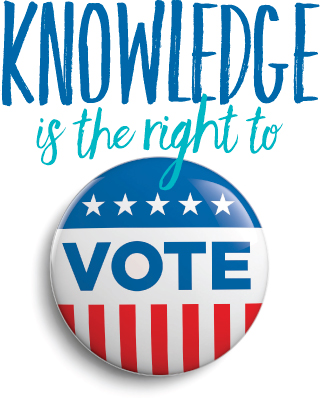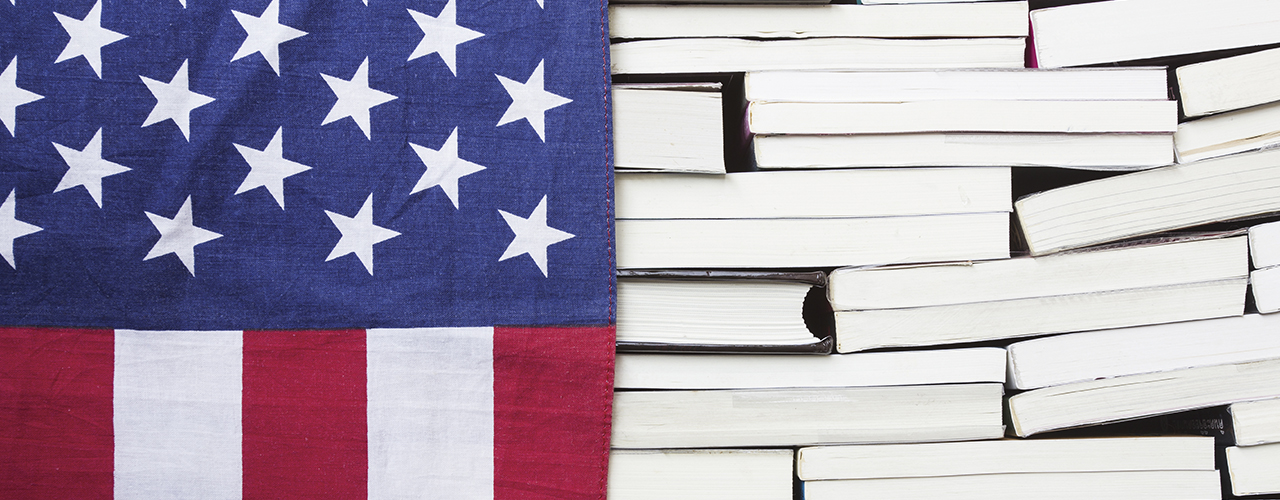Knowledge Is the Right to Vote
Thomas Jefferson, Carl Sagan and Rick Perry all said that an engaged and informed populace is needed in order for the United States to fulfill its promises of liberty. These three individuals, unique in their own thoughts on government, do agree on a fundamental principle—knowledge is required. Citizens have a duty to be cognizant of the functions of government. This includes understanding the role that each American has in the government. To understand one’s place, one also must find reliable, accurate, thought-provoking and objective information. This is a great challenge even 25 years after the Information Superhighway became mainstreamed.
Despite access to information about every subject imaginable, many fail to understand the differences between for profit, corporate-owned media and non-profit, independent media. Even though it is challenging to find solid information, it is an individual’s responsibility to understand the communication process between the government and the citizens. How the government’s messages are delivered matters to those who are seeking knowledge. One needs to know who owns a media corporation and how the ownership determines the content delivered to the audience. Citizens must also demand independent media, which can deliver content from a wide variety of perspectives. Independent media are not driven by profits, but empowered by the First Amendment’s promise of a free press.
Voters looking for reliable information on each candidate should consider looking into the individual’s time served in office. If the candidate is a governor, one might look at the laws signed or vetoed. Doing a thorough investigation into each candidate does require time and effort.

Informed citizens created the American republic. The credentials of the founding men included legal scholars, scientists and multi-lingual philosophers. When small groups of colonists calling themselves patriots revolted against the British monarchy, they did so believing in the fundamental idea of popular sovereignty—a value defined as governments existing for the benefit of the governed. If ever the government failed to protect citizens’ liberties, then those people had the right to overthrow the government. The glorious principles that produced this nation were founded on liberty and the guarantee of representation. However, the creation of a representative republic would not be secured for the largest portion of the population. Only six percent of the population could vote when the United States was created.
The right to vote is a citizen’s voice in their government. The vote decides how one is to be taxed; it decides what curriculum one’s child will learn in school; the vote decides the future personnel in government; and, the vote gives its caster power. Citizens with power make for a secure democratic republic. But the history of the United States demonstrates the struggles of extending suffrage to other members of society. Suffrage for all took many decades and often came at heavy costs for those seeking to vote.
As the country changed, more individuals would secure the vote. The 1828 Presidential election, which ushered in War of 1812 hero Andrew Jackson, included 1 million more votes from the electorate than in the previous presidential election. These new votes came from men who did not own property, but were allowed to vote after states loosened voting restrictions. President Lincoln connected the principles of freedom our nation fought for against Great Britain with the paramount issues facing the country during his Gettysburg Address.
When the 15th Amendment was added to the U.S. Constitution in 1870, a revolutionary milestone was reached. Briefly, during Reconstruction, the United States experienced a biracial Congress, state legislatures filled with former slaves and the choice for black men to self-govern with the vote. Lincoln’s call for “a new birth of freedom” would not be accepted by a South that felt punished by Radical Republicans, black and white.
The Presidential Election of 1876 between Republican nominee, Rutherford B. Hayes, and Democrat Samuel Tilden ended Reconstruction. When Reconstruction ceased, so too did the protection for black Americans to self-govern. Jim Crow policies such as poll taxes, literacy tests and the white primary were legal barriers prohibiting full democratic participation. Americans who even attempted to register to vote in the South faced violence and death.
The right to vote is a citizen’s voice in their government. The vote decides how one is to be taxed; it decides what curriculum one’s child will learn in school; the vote decides the future personnel in government; and, the vote gives its caster power.
Many decades later in 1965, President Johnson signed the Voting Rights Act into law. The law prohibited literacy tests, so Justice Department officials were sent to the South to monitor elections and voter registration drives. Another integral piece of the law required states or jurisdictions with a history of discrimination to clear election law changes with the Justice Department because election laws are determined by each state. In 2011, the Texas Legislature passed a law that required voters to show a state-issued photo identification. The Justice Department stated the Texas law put an undue burden on citizens and could not be enforced. Then, two years later the U.S. Supreme Court overturned sections of the law, which meant Texas could enforce the law.
At the turn of the 21st Century women celebrated 80 years of suffrage. In 1848, at the Seneca Falls, New York convention, women discussed their lack of rights, one of which was the right to participate with the vote. Seventy-two years after Elizabeth Cady Stanton, Susan B. Anthony and others wrote the Declaration of Sentiments, women witnessed the addition of the 19th Amendment.
Felons represent one group of Americans who still face disenfranchisement. An estimated 6 million Americans cannot vote because of felony disenfranchisement laws. Florida has the strictest disenfranchisement laws: one in 10 adults cannot vote and one in four black citizens cannot vote. Maine and Vermont have the least restrictive voting requirements and allow prisoners to vote.
As the 2016 election unfolds, a quarter of Americans are not registered to vote. If Americans are concerned with increasing voting turnout, then efforts should be made to ensure that eligible citizens are registered. We must all remember to vote in every election, not just presidential elections. Our voices matter and our voices are the votes.

